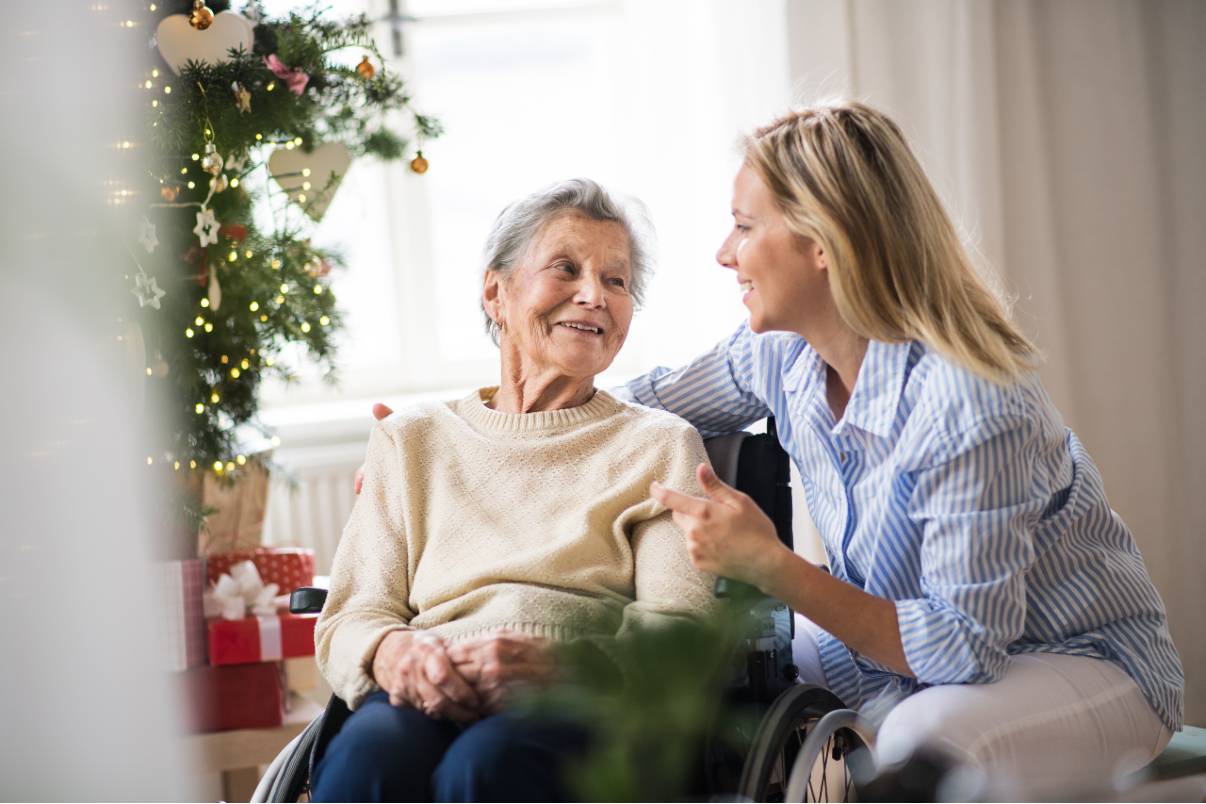
Managing Memory Loss During the Holidays
Even during this unprecedented moment, the holiday season is a special time of year to gather in person or virtually with friends and family members. But for someone with memory loss due to Alzheimer’s disease or other forms of dementia, the addition of decorations with blinking lights and the general hustle and bustle of the holidays can cause them to feel overwhelmed. Here is how you can continue your holiday traditions while ensuring your loved one who’s struggling with memory loss can feel safe.
Tips for Your Holiday Celebrations
How to create a safe and calm space.
- Decorations: Avoid blinking lights or large decorative displays that can cause confusion, add clutter, or require you to rearrange a familiar room.
- Be safe: Substitute electric or battery-operated candles for burning candles. Avoid fragile decorations or decorations that could be mistaken for edible treats, such as artificial fruits. If you have a tree, secure it to a wall.
- Music: Play your loved one’s favorite holiday music at a comfortable and relaxing volume.
How to help the person with dementia enjoy the holidays.
- Team up: Mix batter, decorate cookies, open holiday cards or make simple decorations together. It works best to focus on the task rather than the outcome.
- Think small: Keep celebrations small, quiet and relaxed.
- Be timely: Plan a gathering at the best time of day for your loved one and, as much as possible, keep daily routines in place.
- Quiet place: If you’re having guests over, have a quiet place for your loved one to spend time alone or to visit with one person at a time.
- Find meaning: Read a favorite holiday story, look at photo albums, watch a favorite holiday movie or sing songs.
- Be brief: If you’ll be attending a holiday gathering, plan to be brief or be prepared to leave early if necessary. Also make sure there’s a place for your loved one to rest or take a break.
How to prepare holiday visitors.
If you have family members or friends who haven’t seen your loved one in a while, here are some suggestions to help set realistic expectations.
- Update: Let guests know ahead of time about any changes in your loved one’s behavior, memory or appearance since their last visit.
- Talking tips: Suggest your guests listen patiently and not criticize repeated comments, correct errors or interrupt.
- Have a plan: Tell everyone what activities you have scheduled. You can also suggest they bring a photo album or something else your family member might like.
- Symptoms: Let friends and family know that your loved one’s memory loss is the result of the disease and isn’t intentional. While they may not remember everyone’s names, they still enjoy having company.
- Celebrate together: Stress that the meaningfulness of the moment together matters more than what the person remembers.
How to take care of yourself.
Caring for your loved one with dementia can be hard work. That’s why self-care is crucial during the holidays. Here are some suggestions to ensure the season is enjoyable for you too:
- Be selective: Remember that you can’t do it all. Focus on activities and traditions that are most important to you.
- Get real: Know what you can contribute to family holiday celebrations.
- Delegate: Ask family and friends to help clean house, address holiday cards and shop for gifts.
- Me time: Ask a family member or friend to give you a break so you can enjoy a holiday outing without the responsibilities of caregiving.
Suggestions for Celebrating Remotely
If you decide to meet remotely, here are some suggestions:
- Group discussion: Talk with family and friends via phone, video or email to discuss holiday celebrations in advance. Make sure everyone understands the situation and the precautions you’re taking to help keep your loved one healthy.
- Set boundaries: Do only what you can reasonably and safely manage. No one should expect you to maintain every holiday tradition or event.
- Timing is everything: If your loved one has confusion in the evening (sundowning) consider celebrating earlier in the day.
Physically distant celebrations.
- Be traditional: Drop off baked goods or a care package at your loved one’s front door. Send them a holiday card.
- Have a parade: Ask family members and friends to drive by your loved one’s home with homemade signs or other festive decorations.
- Bundle up: Plan an outdoor visit with hot chocolate and blankets.
- Holiday tour: Walk the neighborhood to enjoy festive lights and decorations.
- Use technology: Use Zoom, Skype or FaceTime to gather virtually. Consider adding some structure — play a trivia game, sing carols or share pictures from past gatherings.
Adapt gift giving.
- Packages: Ask friends and family to mail gifts rather than delivering them in person.
You can then open presents over a video. - Gift list: Suggest useful and enjoyable gifts for your loved one, such as comfortable clothing, music they love to hear, photo albums of family and friends or favorite treats.
- Your gift list: If friends or family members ask what to get you, you may suggest a gift certificate or something that will help make things easier. Examples: housecleaning, lawn care, laundry services or restaurant/food delivery gift cards.
Learn More About Your Options
The memory care community at Presbyterian Village Austell is modeled after the Montessori concept of self-directed activities and uses a person-centered care approach. If you’d like to learn more about the benefits of a community like ours or want advice for managing your loved one’s memory loss, contact us here.


